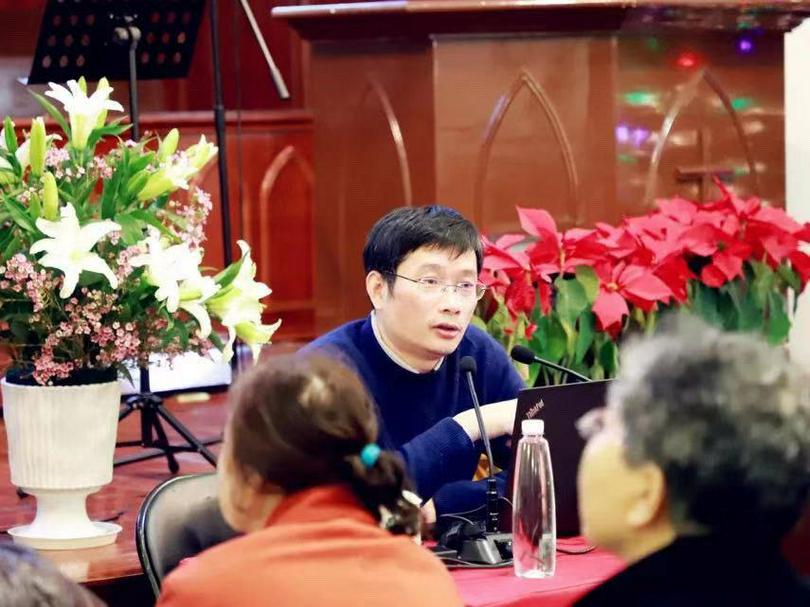On January 4, 2020, Gu Mengfei, secretary general of Three-Self Patriotic Movement (TSPM) was invited to Huizhong Church in Shanghai to deliver a keynote speech on "The Status of International Christianity and Development Trends and Reflections on Sinicization of Christianity in China".
The status of global Christianity
First, Gu introduced the distribution of the world's major religions. He then mainly presented the process of the emergence of Catholicism, Orthodox, and Protestantism in Christianity and their differences in theology and organizational structure, informing his audience of the Christian religion in its development of several important eras: for instance "the Division of the Church into Eastern and Western branches in 1054"; "the Reformation of 1517"; "the Ecumenical Movement" and "the 1910 World Mission Conference in Edinburgh"; and "the Establishment of the World Council of Churches in 1948".
Through a series of up-to-date data and figures, the secretary general provided an overview of the number of Catholic, Protestant and Orthodox believers and their global distribution in recent years. Gu noted in particular that Protestants currently have the largest number in Africa, up to 37% of the total, which contradicts popular ideas about Christians in the United States and Europe followed by the Americas and then Asia.
The top three countries with the largest number of Protestants are the United States, Nigeria and China. According to a 2011 global Christian report released by the Pew Research Center, there are about 58 million Christians in China. According to China's second "Religious White Paper" released in 2018, Christianity has more than 38 million followers in the country. The criteria of the two reports are different, so the results are different.
As for Protestant denominations, Gu particularly introduced the Pentecostals, Charismatics and Evangelicals. Pentecostals have nearly 280 million followers, while Charismatics have 350 million and are currently the world's fastest-growing Protestant denomination. With more than 600 million Christians in Africa in 2018, most of them are Charismatics. Evangelicals are a cross-denominational movement, forming a world-wide coalition with more than 600 million in 130 countries.
Mr. Gu specially noted that followers, although all labeled as evangelicals, are significantly different in cultural, political, and institutional perceptions at this time. For example, various evangelical leaders in the United States hold different opinions about American President Donald Trump.
Developmental trends in global Christianity
Gu showed a set of projected trends in the growth rate of religions for 2015-2060. The world's population growth rate would be 32%, while the growth rate of Muslims would be 70%, well higher than the 34% of Christianity. Thus, by 2070, the number of Muslims would catch up with the numbers in Christianity. And by 2100, the Muslim population would surpass that of Christianity.
From another set of data for the period of 1910 to 2010, although the proportion of Christians in the world population remains largely unchanged, the global distribution of Christians in the world has changed significantly over the past decade. Europe has gone from 66.3% to 25.9% and the Americas from 27.1% to 36.8%, with only a small increase. Africa, on the other hand, increased from 1.4% to 23.6%, and Asia from 4.5% to 13.2%.
This indicates that the the development of Christianity in the world is shifting from Europe and America to Asia and Africa. As a result, the perception of Christianity in the public's mind will change. When people spoke of a Christian in 1850, they may have thought of a member of the mainstream Church of England. In 1950, it might hnave bee a white evangelical. By 2050, it might be a 26-year-old Black African Pentecostal.
Some Christian countries are also facing challenges. According to a report in October 2019, Christianity in the United States continues to decline rapidly, while in Asia, for example South Korea, the church is beginning to decline after decades of growth. By 2050, Australia, the United Kingdom, France, New Zealand, the Netherlands and other countries will no longer be "Christian nations" because Christians will account for less than 50% of the population.
Why is Christianity weakened in these countries? Several photographic images may help us reflect on some serious considerations. After the fire at Notre Dame Cathedral last year, when worship service resumed there, priests lead the Mass in safety helmets which appeared rather as a practical joke. Gu shared examples as well as data in the expectation generating some reflection: will the Chinese Church face similar challenges?
Nevertheless, the reality remains that Christianity's Western influence in the non-Western world is still dominant. The faith and norms of Western believers are viewed as the standard model of Christianity. The inequality of resource allocation, especially financial resources, are still under the control of Western churches. Theological writings of Western theologians and scholars still dominate. And the number of Christian denominations will continue to grow in number, possibly from 41,000 to 55,000.
Seven aspects for consideration
Through this data and these phenomena, the Secretary-General reflected on the question, "Is the southern shift in the focus of Christianity's development only a demographic phenomenon, or should it be seen as theologically or culturally significant?"
In this regard, he put forward seven aspects for consideration:
1. The diversity of Christianity and its sinicization
What we need today is to know how Asian, African, and Latin American churches can been released from the yoke of Western Christianity. We are here, looking at the sinicization of Christianity in China, establishing a Christianity with Chinese characteristics which would really relate to the Chinese Church having a place in the transformation of the universal church so as not simply be an affiliate or insignificant member.
2. Universal faith and patriotism
Referring to the universal faith, he pointed to the unity between the Christian faith and the spirit of "freedom", "love" and "brightness", advocated by both the Christian faith and the country. As to the issue of "Christians should not be patriotic", he took the example of Xie Haotai, a patriotic Christian of the 1911 Revolution and Zhang Boxuan, the former president of Nankai University. Their patriotism made people feel "If we are so patriotic from generation to generation, our social image will certainly be different."
But there are also those so-called Christians who claim to be family church leaders have rather gone to the United States to become U.S. citizens. They have even publicly expressed their desire to "deconstruct China", to promote Hong Kong independence and to promote riots. That is indignant.
3. The mission and preaching
In November 2018, a man who identified himself as a preacher went a native island in the Indian Ocean in violation of local government rules and was shot dead with a poison arrow by the indigenous people there. At that time it raised an international debate. Was this person a martyr or did he deserve this self-inflicted result? Secretary-General Gu cited this example as a reminder to reflect on the issue of the Great Commission and sharing the Gospel. What is the Great Commission? It is a good testimony in the local community, respecting other religions, respecting the local culture. If you ignore the legal and cultural background of a place and go there to preach the Gospel, you put yourself in a very dangerous position.
4. Quantity and quality
There are many believers in Asia, Africa and Latin America, but there is still a gap in quality. Secretary-General Gu showed that the gospel in southern Africa is prospering. But at the same time there is a combining of Charismatic beliefs and local witchcraft, i.e., eating grass to cure diseases, eating poisonous snakes to combat toxicity, driving out demons, identifying witch-children and so on. The same is true of China. The Charismatic movement and China's indigenous folk beliefs are being combined into a religious culture. Both infiltrate each other. People are keen to speak in tongues, see visions, go through spiritual aura, take a "deep breath" of the spirit and so on. In fact, are miracles to be performed by everyone? The guidance to seek these things is improper or can be abused, can easily go to extremes, causes confusion and can result in people become heretics and even join cults. The Boxer Rebellion was a clear example of this.
5. Adherence to unity
Zhao Zixuan, a famous Chinese theologian, once said that the weakness of the Chinese Church lied in "Western-style organization and mentality, and in fragmented denominations". Liu Tingfang also said that "we must strive to advocate for absolute unity, not artificial denominations that destroy the love of God." Not that denominationism is bad, but it may not be so appropriate in China, where the Church is one and cannot go its separate ways.
6. Resist heresies and oppose cults
In 2015, the Chinese Anti-Cult Association published a list of 20 cults of which 16 were under the Christianity banner. 10 of the 16 were indigenous to China such as the Almighty God cult, the 灵灵教 cult, and others. And then there is South Korea's Shincheonji, Church of Jesus, the Temple of the Tabernacle of the Testimony cult which has been particularly rampant in the last two years. These cults are everywhere and woo people, advocate heresy, and caused great harm to the community. There are also some extreme ideas out there: the theology of success, the gospel of prosperity, and the gospel of grace, which are similar to the philosophy of social success but are in fact gimmicks and deceptions.
7. Religious harmony and world peace
Christians who live in this world need to live with non-Christians. In dealing with other religious believers, we must first respect each other, and secondly, promote harmony, advocate for interreligious exchanges, and realize that human destiny is one common body.
- Translated by Charlie Li












